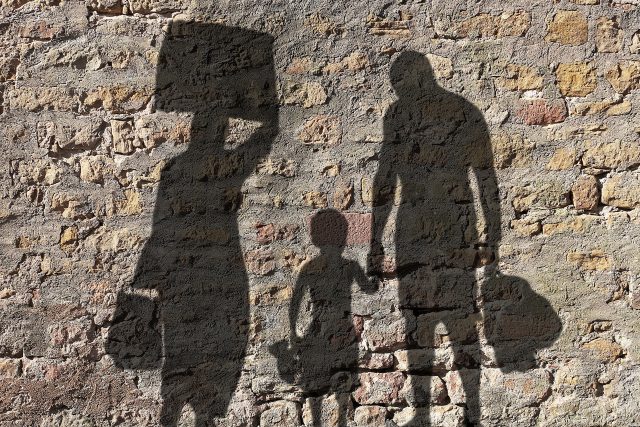
Imagine your life as various points on the highway. Fast Lane, Slow Lane, Shoulder, Ditch.
And at any given time, in any given area, you can be in one of those four.
Living in the Fast Lane means you’re getting where you’re going. You’re fulfilling your purpose.
In the Slow Lane you have a lot of movement, but you never quite seem to get there, wherever “there” is.
On the Shoulder, your “engine” is running, but you’re not moving ahead at all.
In the Ditch means you’ve crashed or are stuck, and without help you aren’t going anywhere.
Having punched my card in all four locations, I can tell you we’re all a mixed bag. You can be idling on the shoulder in one area, cruising in another, and crashed out in a third. So let’s break it down a little more. [click to continue…]

Don’t miss the miracle.
Don’t get fixated on the “only one way” to find light and life and healing and power. Don’t let the miraculous wonder pass you by while you wait for things to be done your way, or the way they’ve always been done in the past.
Listen for the call.
Hear the voice of compassion.
Let faith arise and take Him at His word.
Step boldly in the direction of your dreams and His power.
Find glory in a Father who doesn’t abide by your limited expectations. [click to continue…]

It’s the elephant in your room. It may well be the first thing that people who know you think of when asked about you. But maybe it’s been a part of your architecture so long, you’ve put a lamp shade on it and called it decorations.
I’m talking about something all of us have. The things we wish were different, but check back with us five years from now and our “elephant” is still there. It’s what I call our PWGA. The Problem that Won’t Go Away.
You may refer to it in different language. You may use words like “weakness,” or “cross to bear.” By now you may address it as the “same old same old” or as I did once in reference to my New Year’s resolutions: “Oh, you know, the usual.”
For many people, their PWGA is something that is heart-rending. Something they’ve asked or even begged God to fix, heal, or otherwise change. And yet the PWGA remains.
For other people, a PWGA is a problem requiring a solution they aren’t willing to apply. I know two words that can fix some people’s PWGA: “I’m sorry.” Or their nuclear cousin: “I was wrong.” But that’s too high a price for some people to pay. They’d rather live with the problem.
Some people have PWGAs that they are convinced have solutions. But they haven’t yet found those solutions and don’t know how to leverage their relationship with God to address it.
By now you probably have one or more of your own PWGAs floating around in your mind. Hold that thought. I want to introduce you to another guy. [click to continue…]

Once upon a time, long ago a man was sent on a mission. His responsibilities were clearly laid out and for a while he kept them. But one night he went for a walk and found himself lost.
Lost.
And in the domain of a foreign kingdom.
He was hungry. He was tired. He no longer had the resources provided for him by those who sent him. So he asked for help from the kingdom where he was a trespasser.
That didn’t go well. [click to continue…]

Here’s one that’s sitting on the edge of Cliché-ville…
“Do you believe God has forgiven you?”
“I do.”
“Have the people involved forgiven you?”
“I think so, yes.”
(Pregnant pause…) “But have you forgiven yourself… (more pregnant pause)?
I don’t mean to poke too hard at this – it’s a valid concern. I know plenty of people, myself included, who have become experts at beating themselves up for past failures. I have some vivid memories dating back many years that I can re-live with detailed emotional horror, usually followed by the out-loud words, “Stupid, stupid, stupid!” I sure haven’t forgotten those things. Does that mean I haven’t forgiven myself?
What about the person who isolates from others in the name of solitude, or who lives like Mister Achievement, as if he’s making up for lost time or in some kind of race? Is that what self-forgiveness looks like?
It sounds good to ask the soul-piercing question. But how in the world is somebody supposed to know in truth that they’ve actually forgiven themselves? [click to continue…]

Someone once asked General Norman Schwarzkopf the secret of his success. His reply was simple: “I never walk past a problem.”
That’s the difference between a leader and a politician. Between a leader and a poser. Between a leader and a follower. Between a leader and a talker.
Leaders – those who influence people to take massive action to accomplish a goal or mission – expect problems. But rather than moan about them or wring their hands over how complex they are – rather than kicking the can down the road with Band Aid fixes so a future generation can deal with the real issues – leaders approach problems with the expectation and commitment to solving them.
Anybody can point out problems. Influencers – real leaders – produce solutions. Better still, they challenge others on the team or in the organization to solve problems. So how do you recognize a problem-solving leader or potential leader when you see one? Here are five ways to tell – even if you’re looking in the mirror to find one. [click to continue…]

(A re-examination of a previously-published post from 2007)
It was a poignant conversation that probably ended too quickly. I’m sure it called for a little more tenderness and empathy than I was offering at the time. But hey, at least it was honest.
“I was saved at age 6, and Spirit-filled at age 9,” she said plaintively. “Now I don’t even know there is a God. How do I get my faith back?”
I blurted out an answer that distressed more than blessed…
“You start by showing up.”
I’m sure that wasn’t the answer she was looking for. But I still think it’s true.
When it comes to peace or healing or restoration or growth, human nature has a tendency to self-destruct.
How?
By isolating.
Withdrawing.
Withholding or running away from the situation.
The myth is that:
- Church is for people who have God all figured out.
- Marriage is for people who remain magically in love and intimate.
- Financial planning is for people who have all the money they need to do what they want.
- Friendships are for people who never get disappointed by other people.
It may be time for a healthy dose of reality. [click to continue…]

Here we go again.
Another day.
Another crisis.
Another call for leadership.
Another round of half-mast flags…
Another set of news-bite wags…
A fresh supply of new #hashtags…
And another call for leadership.
More outrage at this
More outrage at your outrage at that,
Another mad rush of the gun shop owners to the bank…
And another call for leadership.
What do we mourn when we bemoan the lack of leadership?
Do we really know what are we calling for? [click to continue…]

Have you ever fantasized about growing wings and flying away to escape the unending stress or tension?
Have you found yourself wishing recently that you could manage to make it through one day without hearing a barrage of angry or critical words or feeling like you must be the only one in the crowd who just doesn’t “get it” (whatever “it” is)?
Have you been avoiding trips to the doctor under the guise that no news is good news, even though you know you’re not as energetic as you used to be?
What’s your latest reminder that the next time the bell tolls – even randomly – your number may be up?
Have you been channel surfing lately for “I Love Lucy” or “Andy Griffith” reruns, just so your TV can remember what it’s like not to hear about another reason to be afraid or another example of urban violence?
Oh, and what’s the latest on the scandal? You know… the same ol’ same ol’ about the latest hero or public figure headed to court or the hall of public shame because they just weren’t who we thought they were?
Are you tired of being lied to by your so-called leaders and oppressed by those in charge?
Are you still reeling from the betrayal of a friend or bitter because someone you trusted and needed abused that trust?
Are you angry enough to hurt somebody yourself? Do people keep asking you what’s the matter and you keep pretending you’re just tired or something stupid like that?
What if I were to tell you that everything I just described didn’t come from CNN or Fox News, but from an ancient poem – a psalm from the Bible? (Well, there are no “I Love Lucy” or “Andy Griffith” reruns or TVs in the Bible, but pretty much everything else is there.) [click to continue…]

(A Conversation)
You know I didn’t make that up.
Yeah, but you sure nailed me with it.
Only because I know what it feels like.
Yeah, I know you do.
So… back to the metaphor… you feel like you’re pushing a 2,000-pound rock up a hill by yourself.
That about sums it up.
Well give me back my rock!
Dude, you can have it.
Just kidding. You can keep it. It looks really nice rolling over you.
Wow, with friends like you…
Yeah, yeah. I do have one question about this picture, though.
Okay.
You have the hill, the boulder, and you.
Uh huh. [click to continue…]









